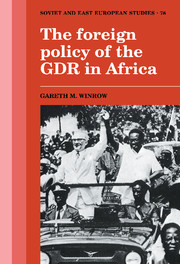Book contents
- Frontmatter
- Contents
- List of tables
- Preface
- Abbreviations
- 1 Introduction
- 2 The development of GDR relations with Africa in the pre-recognition period
- 3 The GDR in Africa in the 1970s
- 4 East German military/security involvement in Africa
- 5 East German economic relations with Africa
- 6 The GDR in Africa in the 1980s
- 7 Conclusion
- Notes
- Select bibliography
- Index
- Soviet and East European Studies
2 - The development of GDR relations with Africa in the pre-recognition period
Published online by Cambridge University Press: 11 January 2010
- Frontmatter
- Contents
- List of tables
- Preface
- Abbreviations
- 1 Introduction
- 2 The development of GDR relations with Africa in the pre-recognition period
- 3 The GDR in Africa in the 1970s
- 4 East German military/security involvement in Africa
- 5 East German economic relations with Africa
- 6 The GDR in Africa in the 1980s
- 7 Conclusion
- Notes
- Select bibliography
- Index
- Soviet and East European Studies
Summary
Introduction
On 10 February 1953 an East German delegation arrived in Cairo at the invitation of the Egyptian government. The visit led to the GDR concluding its first official treaty with an African state when on 7March 1953 a trade and payments agreement was signed with Egypt. Immediately prior to the treaty the Egyptian authorities had refused an offer of West German economic aid because of the conclusion of a reparations agreement between the FRG and Israel in the previous September. According to the reparations agreement the West German government would pay Israel DM 3,000 million in annual instalments by the delivery of certain commodities and services to settle and rehabilitate Jews in Israel. A further DM 450 million was to be paid to the Conference on Jewish Material Claims against Germany. The Arab world feared that these reparations would encourage the development of a formidable Israeli war machine. Eager to acquire Arab support for recognition, East German officials were quick to seize the opportunity to exploit the furore caused by the reparations agreement by initiating contacts with Cairo.
It should be noted that the trade and payments agreement, which opened up possibilities for future East German credit support, was initialled at a time when economic problems were contributing to the June 1953 workers' uprisings in East Berlin and other cities in the GDR. Interestingly, the USSR did not conclude its first official trade agreement with Egypt until March 1954. Moreover, the March 1953 agreement was concluded more than two years before the USSR granted the GDR sovereignty.
- Type
- Chapter
- Information
- The Foreign Policy of the GDR in Africa , pp. 33 - 84Publisher: Cambridge University PressPrint publication year: 1990



